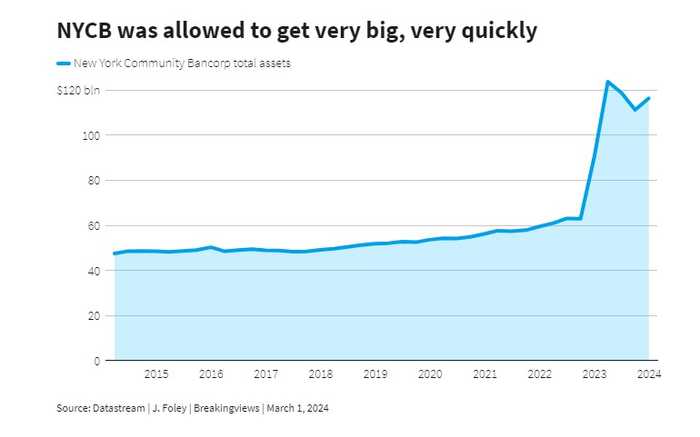Published 19:15 IST, March 2nd 2024
If only banks were more like chemical factories
The manufacturer’s crisis mostly hurts its shareholders, the financial institutions should worry.
- Republic Business
- 2 min read

Purges and acquisitions. Two companies swap out their chief executives after discovering deficient internal controls. One makes chemicals, the other loans. Both lose big chunks of market value. The big difference? The manufacturer’s crisis mostly hurts its shareholders; the financial institution’s should worry everyone.
New York Community Bancorp is the bank here. It replaced Thomas Cangemi on Thursday just weeks after cutting its dividend and warning about bad property loans. The problem isn’t just shaky borrowers, but “material weaknesses” NYCB found in its lending business. Its shares have now fallen by two-thirds in about a month.
At Chemours, more than one head rolled. The pigments-and-coatings supplier, formerly part of DuPont, put its CEO, finance chief and accounting head on leave on Thursday, pending a review into the company’s accounts and the “tone at the top.” Its stock price tumbled by about 30%, leaving it worth about $3 billion, approximately the same as NYCB.
Bad bosses can pop up anywhere, but banks steward deposits that help underpin modern societies. If savers take flight at one lender, those at others sometimes get nervous, too. A failure is a tragedy for employees anywhere; bank collapses threaten whole economies.
At least NYCB’s deposits are safe. Around 95% of them could be covered by the Federal Deposit Insurance Corp’s guarantee if needed. There’s another big difference between NYCB and Chemours, however: oversight. Banks are regularly pored over by legions of government monitors, whose job is to act if they spot problems. Bad management or shoddy lending shouldn’t last long. When it does, it can be a sign that regulators dropped the ball.

There’s a twist at NYCB. It grew very big very quickly, with blessings from authorities. It bought rival Flagstar in 2022, and then last year acquired a stack of loans from the failed Signature Bank. The moves more than doubled its balance sheet to $120 billion, in the process switching its primary supervisor from New York state to the federal Office of the Comptroller of the Currency. It’s not hard to imagine lapses in communication between watchdogs and the work volume overstretching them.
The troubles at Chemours won’t obviously inform the governance at, say, Dow or 3M. But that’s only partly true at NYCB, because the same regulators are meant to be watching hundreds of its peers, too. If these officials weren’t fully alert to what happened at one lender, it’s fair to worry about similar issues lurking elsewhere. Banks really are different, especially when they go awry.
Updated 19:15 IST, March 2nd 2024